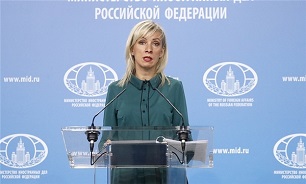Russia Stresses Continued Cooperation with Iran at Bushehr N. Power Plant
 Russian Foreign Ministry Spokeswoman Maria Zakharova told reporters in a press conference in Moscow on Wednesday that construction of the Bushehr power plant was "the Russian flagship project in Iran".
Russian Foreign Ministry Spokeswoman Maria Zakharova told reporters in a press conference in Moscow on Wednesday that construction of the Bushehr power plant was "the Russian flagship project in Iran".
She also noted that although US sanctions create problems for business ties with Iran, Russia "was not standing idle".
Moscow is developing measures, jointly with Tehran, to protect bilateral economic relations from the American bans, Zakharova said.
The Russian-built 1,000-megawatt nuclear power plant in Bushehr, Southern Iran, started operating in 2011 and reached its full capacity the following year.
In 2014, Russia signed a cooperation contract with Iran to help build the second and third Bushehr reactors, which are scheduled for launch in 2024 and 2026, respectively.
Iran says it restarted talks with Russia to build a 3,000-megawatt new nuclear power plant.
Washington withdrew from the internationally-endorsed 2015 nuclear deal with Iran on May 2018, reimposed the toughest-ever sanctions against the country and started a plan to zero down Tehran's oil sales.
Under the nuclear agreement reached between Iran and six world powers in July 2015, Tehran undertook to put limits on its nuclear program in exchange for the removal of nuclear-related sanctions.
Yet, Iran continued compliance with deal, stressing that the remaining signatories to the agreement (specially the Europeans) had to work to offset the negative impacts of the US pullout for Iran if they want Tehran to remain in compliance. The Iranian officials had earlier warned that the European Union’s failure in providing the needed ground for Tehran to enjoy the economic benefits of the nuclear deal would exhaust the country's patience.
Almost a year later, however, the EU failed to provide Tehran with its promised merits. Then, the US state department announced that it had not extended two waivers, one that allowed Iran to store excess heavy water produced in the uranium enrichment process in Oman, and one that allowed Iran to swap enriched uranium for raw yellowcake with Russia.
Until now, Iran was allowed to ship low-enriched uranium produced at Natanz to Russia before it hit the 300-kg limit and the US measure leaves no way for Tehran other than exceeding the ceiling for storing the enriched uranium in violation of the 2015 nuclear deal.
Also, the United States would no longer waive sanctions that allowed Iran to ship heavy water produced at its Arak facility beyond a 300-ton limit set in the 2015 nuclear deal to Oman for storage which again forces Tehran to store it inside country in violation of the nuclear deal.
In return, Iran's Supreme National Security Council (SNSC) announced in a statement on May 8 that the country had modified two of its undertakings under the Joint Comprehensive Plan of Action in return for the US abrogation of the deal and other signatories inability to make up for the losses under the agreement, warning that modifications would continue if the world powers failed to take action in line with their promises.
"The Islamic Republic of Iran declares that at the current stage, it does not any more see itself committed to respecting the limitations on keeping enriched uranium and heavy water reserves," the statement said.
Then Iran gave Europe 60 days to either normalize economic ties with Iran or accept the modification of Tehran’s obligations under the agreement and implement the Europe's proposed INSTEX to facilitate trade with Iran.
Iran set up and registered a counterpart to INSTEX called Special Trade and Financing Instrument between Iran and Europe (STFI) to pave the way for bilateral trade.
Then on June 28, Secretary General of the European External Action Service (EEAS) Helga Schmid announced that INSTEX has become operational.
"INSTEX now operational, first transactions being processed and more EU Members States to join. Good progress on Arak and Fordow projects," Schmid wrote on her twitter account after a meeting of the Joint Commission on JCPOA ended in Vienna following three and a half hours of talks by the remaining signatories to the deal (the EU3 and Russia and China).
It was the 12th meeting of the Joint Commission on JCPOA in Vienna.
Meantime, seven European countries--Austria, Belgium, Finland, the Netherlands, Slovenia, Spain and Sweden--in a joint statement expressed their support for the efforts for implementation of the INSTEX.
Later, Iranian Deputy Foreign Minister Seyed Abbas Araqchi described the nuclear deal joint commission meeting with the Europeans as "a step forward", but meantime, reminded that it did not meet Iran's expectations.
“It was a step forward, but it is still not enough and not meeting Iran’s expectations,” said Araqchi, who headed the Iranian delegation at the JCPOA joint commission meeting in Vienna.
In addition to their defiance of the JCPOA, the Europeans showed more animosity towards Iran earlier this month and seized an Iranian oil tanker by Britain at the US request.
Acting Spanish Foreign Minister Josep Borrell said Gibraltar detained the supertanker Grace 1 after a request by the United States to Britain.
Borrell was quoted by Reuters as saying that Spain was looking into the seizure of the ship and how it may affect Spanish sovereignty as it appears to have happened in Spanish waters.
Spain does not recognize the waters around Gibraltar as British.
Experts believe that the measure taken by the British government in seizing the Syria-bound Iranian tanker is illegal and can have serious consequences for the government in London.
message end/
